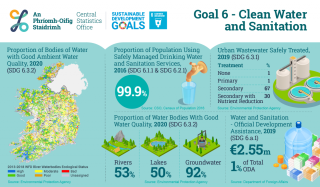SDG6: Ireland’s most vulnerable left behind in accessing clean water and sanitation

According to a new report from the CSO, improvements are needed in Ireland’s waste water treatment to meet safety standards.
CSO The report, which examines the current state of Ireland’s water management identifies the key areas within Sustainable Development Goal 6 (Clean Water and Sanitation) most relevant to Ireland are drinking water, waste water management and the protection of water related systems. According to the 2016 census 99.9 per cent of households in Ireland had a piped water supply and access to a sewerage facility.
Access to quality drinking water
Figures from the 2016 census show that, for 77 per cent of households, water was delivered by way of a public mains connection; 10 per cent had private water schemes; and 8 per cent had a group water scheme. Over 2,200 households are listed as having no piped water supply, with more than one in five of those with a head of household aged over 75 years. While this represents a relatively small percentage of all households (0.1 per cent), now more than ever we must acknowledge the need to have safe water, particularly for the most vulnerable households.
Further, there are about 180,000 private wells across the country, these are not regulated by Drinking Water Regulations and the quality of the water in them is not assessed in annual reports by the Environmental Protection Agency (EPA).
Waste water management
Most of the population is linked to a public sewerage scheme; with 26 per cent accessing individual septic tanks; and “other systems” accounted for a further 4 per cent. As with piped water, over 2,200 households had no sewerage facilities, one in five of which were aged over 75.
Every day in Ireland, more than a billion litres of waste water is collected in the public sewer system and sent for treatment at over 1,100 treatment plants. When the water is treated, it is then released back into rivers, coastal waters and estuaries. Most of the waste water we generate is treated at plants, 98.6 per cent of it in total. In the middle of 2020, untreated waste water (raw sewage) from 35 towns and villages across the country was still being released into our waters every day. Most worrying, according to the CSO’s report, even when the waste water is treated, it still does not meet EPA standards.
In 2019, the EPA issued a report [1]which stated that 92 per cent of Ireland’s urban waste water is generated collectively by large urban areas. More than half of all the urban waste water that is collected within the public sewer systems comes from 19 areas that failed to meet mandatory EU standards in 2019, decreasing from 28 areas in the previous two years. The poor performance of the treatment plant at Ringsend[2] in Dublin is the primary factor affecting Ireland's overall compliance as it treats almost half of the entire country’s urban waste water.
Quality of natural water systems
Across the country, 50 per cent of lakes, 53 per cent of rivers, 59 per cent of water bodies and 92 per cent of ground water bodies had a good ambient water quality. The point of treating waste water is to remove all pollutants so that the water can be released back into the environment. When either untreated or poorly treated water is released, it can contain harmful bacteria that can cause health risks to people or aquatic ecosystems. The agriculture and waste water entering our water bodies cause too many nutrients such as phosphorus and nitrogen to build up and can cause oxygen levels in the water to fall and is the biggest cause of poor quality water.
Policy recommendations
Social Justice Ireland published Measuring Ireland’s Progress: The Sustainable Progress Index 2021 in February ranking Ireland’s progress towards the SDGs against our peers in the EU15. In terms of SDG 6, which calls for ensuring the availability, cleanliness, hygiene and management of sustainable water, Ireland ranked 12th out of 15.
Social Justice Ireland’s Sustainable Development Index contains a range of local and national-level policies to improve Ireland’s progress towards each of the 17 SDGs. At a national level we call on Government to continue to provide support and advice to farmers to improve water quality under the Agricultural Sustainability Support and Advice Programme; and invest further in Ireland’s wastewater system. At the local level, Local Authorities must develop Drinking Water Safety Plans, following EPA Guidelines, for each public water supply, identifying all potential risks and detailing mitigation and control measures.
[1] https://www.epa.ie/pubs/reports/water/wastewater/Urban%20waste%20water%2...
[2] https://www.irishtimes.com/news/environment/ringsend-plant-lacks-capacit...

GIVING A VOICE TO THOSE
WHO DON’T HAVE A VOICE
When you support Social Justice Ireland, you are tackling the causes of problems.
